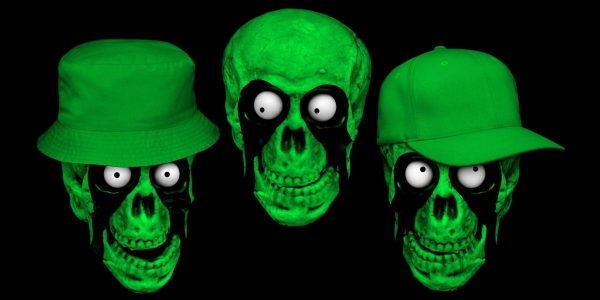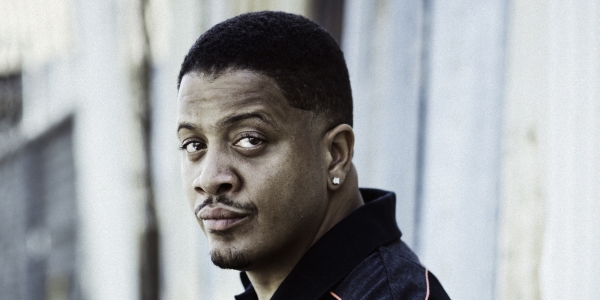It was through battle DJing that the group began to achieve notoriety and suddenly found themselves at the forefront of a burgeoning scene. “The skill side was what you heard on records, people scratching – and that was really what was of interest,” Vegas explains. “There was only one way of finding release for that, and that was through competitions! Over here, there weren’t any big name rappers you could play with on their records and stuff, these competitions were the one opportunity you’d to go out in public and show off what you’d been practicing, and I think that’s how we fell into it. We did pretty much fall into it – you spend years and years practicing, and before you know it you’re onstage in a competition.”
Their anything-goes approach to playing in clubs is one of the things that have gained them such mass appeal among clubbers, beyond the regular confines of genre that tend to hold back a lot of DJs. “A lot of people are DJing on the back of being producers as well; that’s been a major shift, the people who are getting booked for gigs are also the people making the music and a lot of people represent a genre or another, very rarely do they make music that extends beyond that whereas from our point of view, people who play music – I’ve always felt the freedom to play across the board, from hip hop to house and drum and bass to dubstep. By not releasing a great deal of music, there was never one audience for us – if you liked music, you’d like us, because we played everything, so I think there’s a greater freedom for us to do that. I think many people tend to be restricted to a greater degree by the genres they work in.”
We talk about hip hop – the world in which they first found themselves playing in, and I ask if he’s still listening to the same sorts of records he first started out playing. “I’m not the hip hop fan I was, I think,” he admits. “You’d find tunes were often made by grabbing two old copies of a record and creating something new out of it by centering it on one part – by it’s very nature, it can be almost any music, with what I’ve always thought of as a youthful energy – in this [country’s] hip hop scene there’s a massive influx of rap artists dominating the charts, and the dubstep thing is gaining momentum as well – and they have the same kind of infectious quality that hip hop used to when I was a kid. Music that stands the test of time tends to be youth-based music and that’s what hip hop was, but as the number of record labels diminished and became five, then two, then one – the amount of hip hop artists also seemed to diminish and people started doing the same shit, time and time again. I’m not interested in how rich people are, or how many times they can remind me in one album, it bores the hell out of me. I haven’t turned my back on it – if there’s a good hip hop record out, I’ll buy it, listen to it and enjoy it, but I like music that’s more genuine, has a bit more drive to it.”
These days, the boys are noticeably more keen on the dance music side of things. With an incredible Ministry of Sound compilation that saw release in late 2010, featuring everybody from Mala, Skream and The Chemical Brothers to Burial and Four Tet mixed in, it’s an esoteric mix that points to a new direction in their interests. “The dubstep thing in this country, it’s some people’s lives! Their passion for it, and the way in which they enjoy it is infectious, and here, I think it’s very easy to be into a lot of different music at once because there’s so much good music around. One of the good things about the internet is that it’s opened up people to being able to access a lot of different kinds of music, whereas when it used to be more record-store based culture, one store would sell hip hop, another would sell house – they never really crossed paths. But now, you can access every kind of music on the internet, and you can sit at home and be honest with yourself about exactly what it is you like and don’t like. There’s that freedom to listen and enjoy what you want. The way in which dubstep’s gained momentum, it’s difficult to comprehend. This year, Nero released an album and it was inevitable that it would go to number one – which is shocking, in a way! At no time in my life has any kind of youth based music has there ever been that kind of certainty that an underground record like it would go straight to the top of the charts. It’s great! There’s an awful lot of people out there with a lot of ambition and a lot of young people creating a lot of interest in music. As a scene, I like to stand back and watch, and listen, and think to myself, Wow, that’s doing pretty well for itself’.”
Vegas sounds upbeat about the prospect of teaming up with the likes of the Stanton Warriors, LTJ Bukem, A-Skillz and more for a New Year’s Day in Melbourne that promises clubbers the adventure of a lifetime. “Yeah, not a bad way to end a year, is it? I’ve never played with Netsky before and I’m a big fan of a lot of the remixes he’s done. When you turn up at these sorts of events – like I know Bukem and Stanton, and it’s just nice to see people you don’t see that often, and there’s a camaraderie that goes with that which inspires you to have a better time – and hopefully you play a little bit better and try to top everyone else that’s there!” he laughs. “It’s the battle DJ mentality, I can never quite shake it.”

